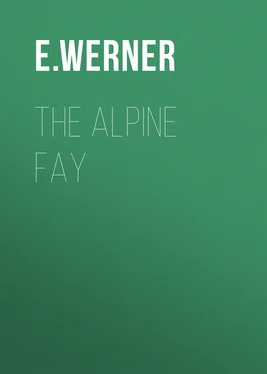E. Werner - The Alpine Fay
Здесь есть возможность читать онлайн «E. Werner - The Alpine Fay» — ознакомительный отрывок электронной книги совершенно бесплатно, а после прочтения отрывка купить полную версию. В некоторых случаях можно слушать аудио, скачать через торрент в формате fb2 и присутствует краткое содержание. Жанр: foreign_prose, foreign_antique, на английском языке. Описание произведения, (предисловие) а так же отзывы посетителей доступны на портале библиотеки ЛибКат.
- Название:The Alpine Fay
- Автор:
- Жанр:
- Год:неизвестен
- ISBN:нет данных
- Рейтинг книги:4 / 5. Голосов: 1
-
Избранное:Добавить в избранное
- Отзывы:
-
Ваша оценка:
- 80
- 1
- 2
- 3
- 4
- 5
The Alpine Fay: краткое содержание, описание и аннотация
Предлагаем к чтению аннотацию, описание, краткое содержание или предисловие (зависит от того, что написал сам автор книги «The Alpine Fay»). Если вы не нашли необходимую информацию о книге — напишите в комментариях, мы постараемся отыскать её.
The Alpine Fay — читать онлайн ознакомительный отрывок
Ниже представлен текст книги, разбитый по страницам. Система сохранения места последней прочитанной страницы, позволяет с удобством читать онлайн бесплатно книгу «The Alpine Fay», без необходимости каждый раз заново искать на чём Вы остановились. Поставьте закладку, и сможете в любой момент перейти на страницу, на которой закончили чтение.
Интервал:
Закладка:
It was just before the beginning of the entertainment when the president with Elmhorst entered the first of the large reception-rooms. He was apparently in the best of humours and upon excellent terms with his future son-in-law.
"You have your first introduction to the society of the capital this evening, Wolfgang," said he. "In your brief visits you have seen only our family. It is time for you to establish relations here, since it will be your future place of residence. Alice is accustomed to the society life of a great city, and you can have no objection to it."
"Of course not, sir," Wolfgang replied. "I like to be at the centre of life and activity, but hitherto it has been incompatible with the duties of my profession. That it will not be so in the future I see from your example. You conduct from here all your various undertakings."
"This activity, however, is beginning to oppress me," said Nordheim. "I have latterly felt the need of a support, and I depend upon your partially relieving me. For the present you are indispensable in the completion of the railway line; the engineer-in-chief, in his present state of feeble health, is the head of the work only in name."
"Yes, it is in fact entirely in my hands, and if he retires,–I know he is thinking seriously of doing so,–I have your promise, sir, that I shall succeed him?"
"Assuredly, and this time I am not afraid of meeting with any opposition. It is, to be sure, the first time that so young a man has been placed at the head of such an undertaking, but you have shown your ability in the Wolkenstein bridge, and the position can scarcely be refused to my future son-in-law."
"In admitting me to your family, Herr Nordheim, you give me much.–I know it," said Elmhorst, gravely; "in return I can give you only a son."
The president's eyes rested thoughtfully upon the face of the speaker, and with an access of warmth extremely rare in the man of business, he replied, "I had an only son, in whom all my hopes were centred; he died in early childhood, and I have often reflected bitterly that some spendthrift idler would probably scatter abroad what I had taken such pains to accumulate. I think better of you; you will continue and preserve what I have begun, complete what I leave unfinished. I am glad to make you my intellectual as well as my material heir."
"I will not disappoint you," Wolfgang said, pressing the hand extended to him.
Here were two kindred natures, but surely the conversation was a strange one for the evening of a betrothal and while awaiting a promised bride. Both men had spoken of their schemes and undertakings; Alice had not been mentioned. The father had demanded of his future son-in-law much, but there had been no allusion to his daughter's happiness; and the lover, who seemed entirely sensible of the advantages of the family connection in prospect, never mentioned the name of his betrothed. They talked of construction and bridges, of the engineer-in-chief and the railway company, as coolly and in as business-like a fashion as if the matter in question were a partnership to be formed between them; and in fact it was nothing else,–either could easily have foregone the additional relationship. They were interrupted, however: a servant entered to ask for orders from the president with relation to the arrangement of the table, and Nordheim thought best to betake himself to the dining-hall to decide the matter. It was still too early for the arrival of the guests, and the ladies of the house had not yet made their appearance. The servants were all at their posts, and for the moment Wolfgang was left alone in the reception-rooms, which occupied the entire upper story of the mansion.
From the large apartment where he was, with its rich crimson rugs and velvet hangings, and its profusion of gilding, he could look through the entire suite of rooms, the splendour of which was most striking in their present deserted, empty condition. Everywhere there was a lavish wealth of costly objects, everywhere pictures, statues, and other works of art, each one worth a small fortune, and the long suite ended, as in some fairy realm, in a dimly-lit conservatory filled with exotic plants of rare magnificence. In an hour these brilliant, fragrant apartments would be crowded with the most distinguished society of the capital, all ready to accept the hospitality of the railway king.
Wolfgang stood still and looked slowly about him. It was indeed a bewildering sensation, that of knowing himself a son of this house, the future heir of all this magnificence. No one could blame the young man if at the thought he stood proudly erect, while his eyes gleamed exultantly. He had kept the vow made to himself,–he had executed the bold scheme which he had once confided to his friend,–he had dared the flight and had reached the summit. At an age when others are beginning to shape their future he had clutched success in a firm grasp. He was now standing upon the height of which he had dreamed, and the world lay fair indeed at his feet.
The drawing-room door opened; Elmhorst turned and advanced a few steps towards it, then paused suddenly, for instead of his expected betrothed Erna von Thurgau entered. She was much changed since she had been met by the strayed young superintendent among the cliffs of the Wolkenstein. The wayward child who had grown up free and untrammelled among her mountains had not without result passed three years in her uncle's luxurious home, under the training of Frau von Lasberg. The little Alpine rose had been transformed to a young lady, who with perfect grace but also with entire formality returned Wolfgang's salutation. This was a beautiful woman, a gloriously beautiful woman.
Her childish features had become perfectly regular, and although the rich bloom of health still coloured her cheek, her face expressed a degree of cool gravity unknown to the joyous daughter of the Freiherr von Thurgau. Her eyes no longer laughed as of old; there lay hidden in their depths a mystery akin to that of the mountain-lakes of her home, whose colour they had borrowed,–a mystery as powerfully attractive as that of the lakes themselves. She looked singularly lovely as she stood in the full light of the chandelier, dressed in pure mist-like white, her only ornaments single water-lilies scattered here and there among its whiteness. Her hair no longer fell in masses about her shoulders, but fashion permitted its full luxuriance to be appreciated, and pale lily-buds gleamed amid its waves.
"Alice and Frau von Lasberg will be here presently," she said, as she entered. "I thought my uncle was here."
"He has gone for a moment to the dining-hall," Elmhorst replied, after a salutation quite as formal as her own.
For an instant Erna seemed about to follow her uncle, but, apparently recollecting that this might be discourteous towards a future relative, she paused and let her gaze wander through the long suite of rooms.
"I think you see these rooms fully lighted to-night for the first time, Herr Elmhorst? They are very fine, are they not?"
"Very fine; and upon one coming, as I do, from the winter solitude of the mountains, they produce a dazzling impression."
"They dazzled me too when I first came here," the young lady said, indifferently; "but one easily becomes accustomed to such surroundings, as you will find by experience when you take up your residence here. It is settled that you are to be married in a year, is it not?"
"It is,–next spring."
"Rather a long time to wait. Have you really consented to such a period of probation?"
The lover seemed, oddly enough, to be rather averse to this allusion to his marriage. He examined with apparent interest a huge porcelain vase which stood near him, and replied, evidently desirous of changing the subject, "I cannot but consent, since for the present I am master neither of my time nor of my movements. The first thing to be attended to is the completion of the railway, of the construction of which I am superintendent."
Читать дальшеИнтервал:
Закладка:
Похожие книги на «The Alpine Fay»
Представляем Вашему вниманию похожие книги на «The Alpine Fay» списком для выбора. Мы отобрали схожую по названию и смыслу литературу в надежде предоставить читателям больше вариантов отыскать новые, интересные, ещё непрочитанные произведения.
Обсуждение, отзывы о книге «The Alpine Fay» и просто собственные мнения читателей. Оставьте ваши комментарии, напишите, что Вы думаете о произведении, его смысле или главных героях. Укажите что конкретно понравилось, а что нет, и почему Вы так считаете.











